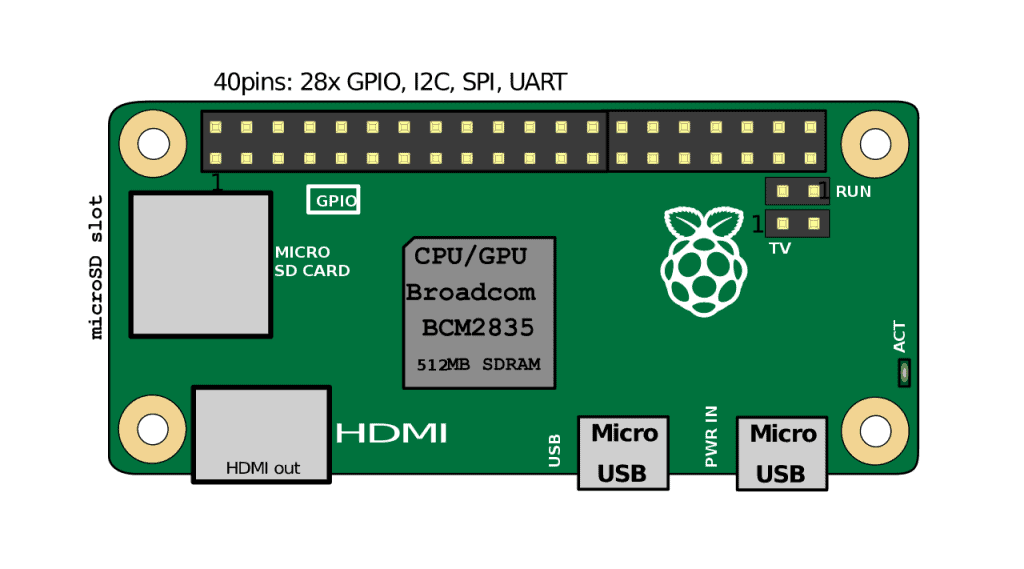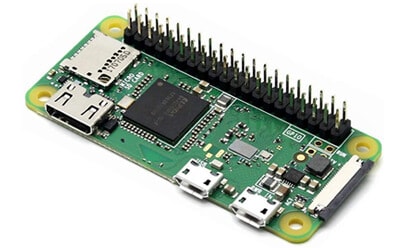Raspberry Pi Zero
The Raspberry Pi Zero is the smallest and cheapest Raspberry Pi available. At about half the size of other models, it offers a new set of possibilities.
It’s the perfect option if you need something discreet or need to be powered constantly. Projects ideas like a security camera, a Game Boy or even a weather station are ideal for this model.
In this page, you’ll find all the information you might need about this model.
Specifications
| v 1.2 | v1.3 | W / WH | 2 W | |
|---|---|---|---|---|
| Release Date | Nov. 2015 | May 2016 | Feb. 2017 | Oct. 2021 |
| CPU | 1GHZ Single Core (ARMv6) | 1GHZ Single Core (ARMv6) | 1GHZ Single Core (ARMv6) | 1GHZ Quad Core (ARMv8) |
| RAM (MB) | 512 | 512 | 512 | 512 |
| Micro USB | 1 | 1 | 1 | 1 |
| Network | No | No | Wi-Fi / Bluetooth | Wi-Fi / Bluetooth |
| Dimensions (mm) | 65 x 30 x 5 | 65 x 30 x 5 | 65 x 30 x 5 | 65 x 30 x 5 |
| Idling power consumption (mA) | 100 | 100 | 100 | 150 |

Hardware
Kit
If you are looking for your first Raspberry Pi Zero, I highly recommend finding a good kit rather than buying everything separately.
As you only have micro USB and micro HDMI on it, you’ll need a bunch of adapters to use it. The case is also different from the other models.
I’m using this kit from Vilros that you can get on Amazon. There is everything you need to start in it. The case is excellent and has 3 lids depending on the way you will use it (normal, GPIO or camera).
The Raspberry Pi Zero 2 W is almost the same price, so if you happen to find a kit for this version, I highly recommend going for it (but like most models currently, it’s hard to find one). The accessories are the same, so you can follow my links below whatever the model you use.
Essentials
If you still prefer to buy the accessories separately, here are what you will need at least:
- The power supply (not included in the $15 price)
- Probably an SD card: this is the one I recommend for decent performances and price. If you want the best one, you can check my benchmark here.
Then you can install your Raspberry Pi Zero without any screen, mouse or keyboard, but I highly recommend some adapters:
- A Micro-USB/USB adapter
- A Micro-HDMI/DMI cable: the basic model will be perfect. A cable often work better than an adapter by the way. And you can use it on other hardware, like most cameras.
- Micro-USB to Ethernet adapter: there is no Ethernet port on this model, but you can plug it with an adapter like this one.
A USB hub can be a good idea too. As there is only one micro USB port on the Pi Zero. You can pick the adapter above and plug a hub you already have, or use something like that, all in one.
When you add all the prices of these items, you can see that the kit is really worth it. And I didn’t even include a case, as it’s not “essential” to use it.
Cases
There are several options for your case, depending on how you want to use it, and the budget you have:
- The official one: if you are looking for something cheap and basic, this is the one to choose.
- The USB dongle: can be convenient depending on how you are using your Pi Zero. It will power it directly, like a USB key.
- Game Boy Case: probably more for gamers, but can be fun for any usage.
HATs
Finally, you need to know that HATs are different on Raspberry Pi Zero. You can use any HAT, but as the format is not the same, you can find equivalents corresponding to the Pi Zero size:
- SIM HAT: This one will upgrade your Raspberry Pi Zero to use phone calls, SMS or data transfer (4G)
- LCD: You may have seen one in the game boy case, so yes, you can plug a screen HAT on your device.
- Sound card: The size of the Pi Zero make it the perfect choice for a media center or Volumio solution. But there is no audio output. It’s fixed with that kind of HAT
This is just a quick selection, there are many other HATs available on Amazon or your favorite reseller.
Related tutorials


